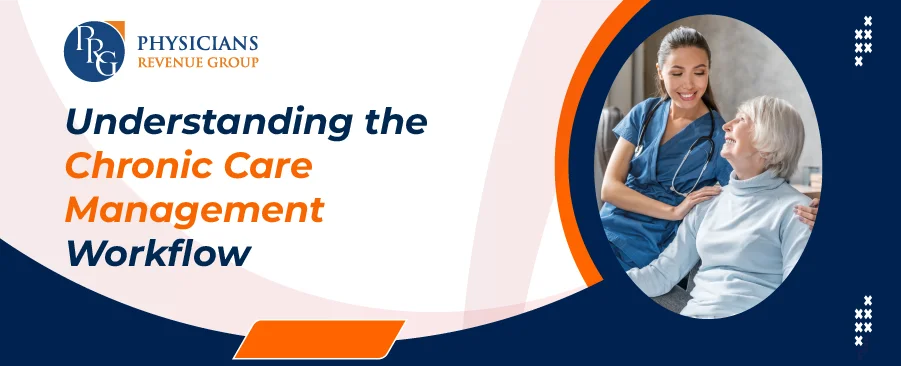
Email: info@prgmd.com | Call: +1 (630) 242-6474
Business hours: 9:00 to 5:00 | Monday to Friday
Email: info@prgmd.com | Call: +1 (630) 242-6474
Business hours: 9:00 to 5:00 | Monday to Friday

Table of Contents
ToggleDo you have a medical practice that doesn’t fully understand the chronic care management workflow? You are not alone, and this guide will specifically touch all corners of chronic care management and its corresponding medical billing workflow. Furthermore, suppose your healthcare practice is looking to improve patient services and increase value-based reimbursement. In that case, the chronic care management program (CCM) from CMS (Centers for Medicare & Medicaid Services) can help you achieve such goals.
The CCM or chronic care management workflow is about serving patients under Medicare with two or more chronic conditions. CCM acts as a preventative service in assisting Medicare patients to take on a proactive approach to their health and wellness outcomes. All of this is possible while keeping them attached to their healthcare providers.
Recent statistics suggest that over 80% of chronic diseases can be eliminated via preventative measures. Furthermore, two-thirds of all deaths in the USA are attributed to one of the 5 major chronic disorders, and these include:
A comprehensive CCM program can assist your practice in offering earlier interventions in the patients, encouraging compliance with the medication regimens, supporting lifestyle improvements, and decreasing the number of hospitalizations, unnecessary ER visits, and other complications your patients may face.
The first step in understanding the chronic care management workflow is knowing who can participate in chronic care management billing. In addition to the physicians, the following non-physician practitioners can also bill for the CCM services:
When you move towards determining which type of patients will qualify for enrollment in a CCM program, it is vital to keep the below requirements in mind:
CMS offers the below examples of adequate chronic conditions, including:
The practitioners and carriers must have comprehensive patient care plans to meet the CCM criteria. By expanding these care plans, healthcare practices can provide person-focused or personalized care.
What should a care plan include?
It is essential to make these plans easily accessible to caregivers and patients. It is also vital to be available to other healthcare providers if and when needed. Furthermore, healthcare practices and providers can also use a patient portal for patients to access the electronic copy of their care plans readily.
As a part of the chronic care management workflow, healthcare providers must track the time for non-face-to-face services for every CCM patient. Patient prescription management, calls to patients, medication reconciliation, and care coordination with other healthcare facilities and practitioners are a few examples of time-tracking duties.
Healthcare practices may even employ chronic care managers to oversee care coordination, education, and coaching.
If your practice is interested in the CCM program, but your staff is already too burdened to tackle the chronic care management workflow, consider outsourcing the CCM medical billing workflow to a third-party billing provider like Physicians Revenue Group, Inc.
Healthcare facilities today already have too much on their plates, and it is difficult to imagine giving your staff more work, even when that can help your patients. The good news is that CCM services are simple and easy to implement. Furthermore, when done correctly, efficient CCM programs offer healthcare providers valuable insights into their patients and create a streamlined approach to patient care.
Further avenues where a CCM program can help providers:
The CCM services include personalized care from dedicated healthcare professionals, offering round-the-clock emergency access to healthcare professionals, in addition to coordination of care between:
Benefits of outsourcing medical billing services are:
Share:
Categories
Recently Added

What is an ABN in medical billing?

What does a Clearinghouse do During Claims Submission?

What is EOR in Medical Billing?
We Would Love to Assist You!
We treat your data confidentially and don’t share any information with a third party.